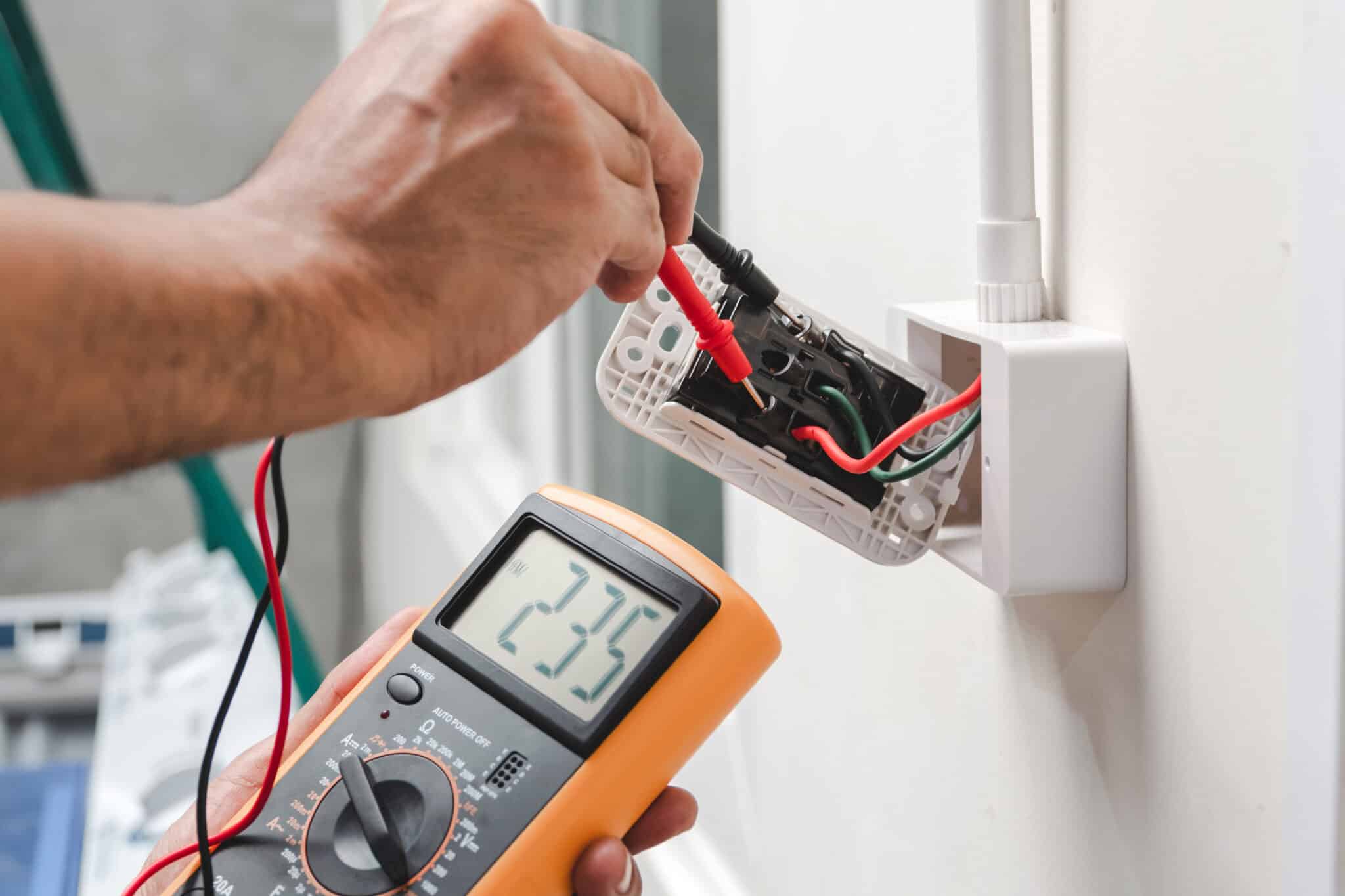Winter brings chilly weather, cozy blankets, and festive lights—but it also comes with some serious electrical hazards. Have you ever noticed how many gadgets and heaters you plug in during the colder months?
From space heaters to holiday decorations, all that extra electricity can lead to big problems if you’re not careful. Whether you live in West Columbia, Lexington, Irmo, or Columbia, winter conditions make it easier for electrical accidents to happen.

Importance of Electrical Safety in Winter
Winter puts a lot of pressure on your home’s electrical system as heaters, electric blankets, and holiday decorations get plugged in more than usual.
The extra load can easily overwhelm circuits and lead to dangerous problems like power surges or electrical fires.
In areas like West Columbia, Lexington, Irmo, and Columbia, wet winter weather adds to the risk, making it easier for water to come into contact with electrical outlets and cords.
Slippery conditions outside can also lead to accidents, especially when water gets tracked indoors near electrical sources.
Staying mindful of these dangers and practicing good electrical safety habits can prevent emergencies and ensure your home stays safe throughout the season.
Hazard 1: Overloaded Circuits
During winter, the increased use of electrical devices like space heaters, kitchen appliances, and holiday lights can overload circuits if too many are connected to a single outlet.
This can cause tripped breakers, damaged wiring, or even fires, especially in older homes across West Columbia, Lexington, Irmo, and Columbia with outdated electrical systems. Overloaded circuits not only pose a threat to your property but can also endanger your family.
How to Prevent Overloaded Circuits
- Spread Out Appliances: Avoid plugging multiple high-energy devices, such as heaters or kitchen equipment, into a single outlet to prevent overheating or tripping the breaker. Use outlets in different rooms or circuits to distribute the electrical load evenly.
- Use Surge-Protected Power Strips: These protect your appliances from voltage spikes and lower the risk of fires caused by sudden electrical surges. Look for power strips with built-in circuit breakers to automatically cut off power if the system becomes overloaded.
- Unplug Unused Appliances: Devices like electric blankets, heaters, and chargers still consume electricity in standby mode. Disconnecting them ensures your system doesn’t experience unnecessary stress and frees up power for other essential devices.
- Monitor Circuit Breakers: Frequent tripping signals that a circuit is overloaded or faulty. If this happens regularly, investigate the root cause instead of constantly resetting the breaker, as it could indicate a deeper wiring issue.
- Schedule an Electrical Inspection: An electrician can assess whether your system meets current standards and recommend upgrades, like adding circuits or rewiring, to safely handle the demands of modern appliances.
Hazard 2: Improper Use of Heaters
Space heaters are a popular way to stay warm during winter, but using them incorrectly can create serious risks. Many accidents happen when heaters are left unattended, placed too close to flammable objects, or plugged into inappropriate outlets.
These mistakes can lead to electrical fires, burns, or short circuits. Portable heaters also tend to draw significant power, which increases the strain on your home’s electrical system. It’s crucial to handle heaters with care to keep your family safe and your electrical system working properly.
How to Safely Use Heaters
- Place Heaters on Flat, Stable Surfaces: Always set heaters on non-flammable surfaces, such as tile or hardwood floors, to prevent them from tipping over or overheating carpets.
- Keep Heaters Away from Flammable Items: Maintain at least three feet of space between heaters and objects like curtains, blankets, or furniture to reduce fire risks.
- Plug Heaters Directly into Wall Outlets: Avoid using extension cords or power strips, as heaters require a lot of electricity and can overload these connections.
- Turn Off Heaters When Unattended: Always switch off heaters when leaving a room or going to sleep to prevent accidents from occurring.
- Inspect Heaters Regularly: Check for frayed cords, cracked casings, or other signs of damage. If you notice anything unusual, replace the heater immediately to avoid electrical malfunctions.
Hazard 3: Wet and Slippery Conditions
Winter often brings rain, snow, and moisture, which can create hazardous electrical situations inside and outside the home. Water is a great conductor of electricity, so even a small amount can cause electric shocks, short circuits, or damage to appliances.
Wet shoes or umbrellas left near outlets or power cords can increase these risks. Slippery conditions can also cause people to accidentally knock over electrical devices, leading to exposed wires or other dangers. Keeping moisture away from electrical components is essential for preventing accidents.
How to Manage Wet Conditions Safely
- Keep Electrical Devices Elevated: Use shelves or tables to keep devices off the floor, especially in areas prone to moisture, like entryways or basements.
- Wipe Up Spills Immediately: Make it a habit to dry floors and surfaces around outlets and cords to prevent water from reaching them.
- Use Outdoor-Rated Equipment for Exterior Decorations: Ensure all outdoor lights and cords are waterproof and designed to handle wet weather safely.
- Wear Dry Shoes When Handling Electrical Devices: Avoid plugging or unplugging appliances if your hands or shoes are wet, as this increases the chance of shocks.
- Install Ground Fault Circuit Interrupters (GFCIs): GFCIs automatically cut power when they detect moisture, adding an extra layer of safety for areas like bathrooms, kitchens, and outdoor spaces.
Hazard 4: Damaged or Exposed Wires
Damaged or exposed wires are a serious electrical hazard, especially during winter when power usage increases. Frayed or cracked insulation can expose the inner wiring, which poses the risk of electric shocks, sparks, or fires.
Rodents seeking warmth may chew on wires, further increasing the danger. Cold temperatures can also cause some wires to stiffen or crack, creating hidden issues that go unnoticed until they cause problems. Keeping an eye on the condition of your electrical cords and wiring is essential to avoid these electrical hazards.
How to Handle Damaged or Exposed Wires Safely
- Inspect Cords and Wires Regularly: Check for any fraying, cracks, or exposed wiring on all appliances and extension cords. Replace damaged items immediately to prevent accidents.
- Avoid Using Tape as a Quick Fix: Electrical tape should only be a temporary solution; damaged wires need to be replaced or repaired by a professional.
- Keep Wires Away from High-Traffic Areas: Prevent cords from being stepped on or pinched by furniture to avoid unnecessary wear and tear.
- Store Electrical Cords Safely: Avoid wrapping cords too tightly when not in use, as this can weaken the internal wiring over time.
- Hire an Electrician for Wiring Issues: If you suspect that your home’s wiring is damaged, have it inspected and repaired by a licensed electrician to ensure your system is safe and reliable.
Hazard 5: Extension Cord Misuse
Extension cords are helpful during winter, especially when plugging in holiday decorations or extra heaters, but misusing them can create serious electrical risks. Overloading an extension cord with too many devices can cause it to overheat and potentially lead to a fire.
Additionally, using cords that are not rated for outdoor use in wet conditions increases the risk of electric shocks and equipment failure. Long-term reliance on extension cords instead of proper wiring can also strain your electrical system. Safe usage is key to avoiding these hazards and keeping your home protected.
How to Use Extension Cords Safely
- Use the Right Cord for the Job: Always choose cords that are rated for the devices you’re powering, and ensure outdoor cords are weatherproof and designed for exterior use.
- Avoid Overloading Extension Cords: Plugging too many devices into one cord increases the chance of overheating, so be mindful of the cord’s wattage limit.
- Inspect Cords for Damage Before Use: Look for signs of fraying, cracking, or exposed wiring. If a cord is damaged, replace it immediately instead of attempting a temporary repair.
- Don’t Run Cords Under Rugs or Furniture: Covering cords can cause them to overheat, and the constant pressure from furniture can damage the wiring over time.
- Use Extension Cords as a Temporary Solution: Extension cords are not a substitute for permanent wiring. If you need extra outlets, consider having an electrician install them safely.

The Role of Home Electrical Inspections
Importance of Regular Electrical Inspections
Regular electrical inspections are critical for spotting electrical hazards before they become emergencies.
Winter is an ideal time for inspections since it places extra strain on your system, exposing potential problems like overloaded circuits and worn-out wiring.
These inspections catch issues that might otherwise go unnoticed, such as hidden damage to cords or outdated components. Identifying electrical hazards early helps avoid power outages, shocks, or electrical fires, keeping your home and family safe.
What to Expect During an Inspection
A licensed electrician will perform a thorough inspection to identify electrical hazards and ensure your system meets current safety standards. They will examine wiring, outlets, and circuit breakers, looking for damage, loose connections, and signs of stress from high power usage.
The electrician will also test outlets near water sources, confirming they have ground fault circuit interrupters (GFCIs) to prevent shocks. By the end of the inspection, you’ll receive a report detailing any electrical hazards found and recommendations to fix them.
How Inspections Can Prevent Hazards
Electrical inspections play a key role in preventing electrical hazards by identifying issues early and ensuring your system operates safely. They help detect problems such as overloaded circuits, exposed wires, or faulty breakers, which are common causes of winter electrical accidents.
Fixing these issues in advance prevents fires, shocks, and equipment failures, saving you from costly repairs and disruptions. With regular inspections, you minimize the chance of electrical hazards occurring, keeping your home safe and functioning efficiently throughout the winter.
Recognizing Emergency Situations
When to Call an Electrician
It’s critical to call an electrician if you encounter serious electrical hazards or warning signs such as tripped breakers that won’t reset, flickering lights, or a burning smell near outlets. If you see sparks or notice warm outlets, don’t delay—these are indicators of underlying electrical issues that could escalate into an emergency.
An electrician can diagnose and fix these problems before they result in a fire or electrical injury. Never attempt DIY fixes for electrical emergencies, as improper handling can make the situation worse and more dangerous.
Signs of Electrical Emergencies
Certain electrical hazards should never be ignored, as they often signal an emergency situation. Look out for frequent breaker trips, outlets that feel hot to the touch, or lights that constantly flicker.
Other signs include appliances that shock you upon touch or switches that spark when turned on. These emergencies often point to overloaded circuits, faulty wiring, or exposed wires, and addressing them immediately helps prevent serious accidents.
Safety Measures to Take Before Help Arrives
When dealing with electrical hazards, taking quick safety steps can make a big difference while waiting for a professional to arrive. If possible, cut off power to the affected area using the circuit breaker to reduce the risk of fires or electrical shocks.
Avoid touching appliances or outlets that seem damaged or overheated, and keep children and pets away from the area. If water is involved, such as during a flood or leak, do not attempt to unplug devices—leave that to the electrician. These precautions ensure everyone’s safety while giving you time to get the help you need.
Educating Your Family About Electrical Safety
Teaching Kids About Electrical Hazards
Introducing kids to electrical hazards in a way they can understand helps them develop good safety habits. Teach them not to touch outlets or cords with wet hands and to avoid pulling on cords to unplug appliances.
Explain the dangers of using electronics near water and why they should never play with electrical devices or outlets. Demonstrating these safety tips through simple examples will help them remember what to do and stay cautious. Creating a learning environment that promotes safety awareness helps prevent accidents before they happen.
Creating a Family Safety Plan
A family safety plan prepares everyone in the household to act quickly if electrical hazards arise. Identify areas with high electrical usage, such as the kitchen or living room, and agree on rules for safely using appliances and cords.
Make sure everyone knows where the circuit breaker is located and how to turn off the power in case of an emergency. Assign responsibilities to older children and adults so that each person knows what to do if electrical issues occur. This plan ensures everyone is ready to respond calmly and efficiently when needed.
Keeping Safety Equipment Accessible
Having safety equipment available can make all the difference when dealing with electrical hazards. Keep fire extinguishers rated for electrical fires (Class C) in easy-to-reach places, such as the kitchen or near heaters.
Make sure every family member knows where these extinguishers are and how to use them safely. Consider placing outlet covers on unused outlets to protect young children from shocks.
Additionally, a flashlight or battery-powered lantern can be helpful during power outages caused by electrical problems. Having the right tools available ensures you can act quickly and safely when needed.
Stay Safe from Electrical Hazards This Winter—We’ve Got You Covered!
Don’t let electrical hazards ruin your winter comfort. Whether you’re in West Columbia, Lexington, Irmo, or Columbia, trust Mister Sparky of Columbia to keep your home’s electrical system safe and efficient.
Our licensed electricians are ready to identify potential hazards and provide expert solutions that ensure your home stays protected through the colder months. Call us today to schedule an inspection and enjoy a safer winter season!
FAQs About Electrical Hazards
What should I do if I see sparks from an outlet?
If you notice sparks from an outlet, it is a clear sign of electrical hazards that require immediate action. Turn off the power to the affected area by switching off the breaker and avoid using the outlet until an electrician can inspect it. Sparks often indicate faulty wiring or overloaded circuits, which are dangerous electrical hazards if left unchecked.
How can I tell if my electrical system is safe for winter?
Look for signs of electrical hazards, such as flickering lights, warm outlets, or frequent breaker trips, as these indicate potential problems. Scheduling a professional inspection is a good way to ensure your system can handle winter demands without posing risks. Identifying and fixing electrical hazards early will prevent accidents during the colder months.
Are there special precautions for using holiday lights?
Using holiday lights incorrectly can increase electrical hazards, so always check for frayed wires and use outdoor-rated lights if decorating outside. Avoid plugging too many light strings into a single outlet, which can overload the circuit and create dangerous electrical hazards.
What kind of extension cords are safe for heaters?
Most extension cords are not rated to handle the high wattage required by heaters, which can result in serious electrical hazards. If you must use an extension cord, make sure it is heavy-duty and properly rated for the heater’s power load to avoid overheating.
How often should I have my electrical system inspected?
Regular inspections are crucial to identifying hidden electrical hazards before they cause emergencies. It’s recommended to have your system inspected every 3 to 5 years or sooner if you’ve experienced breaker trips, flickering lights, or other warning signs.




